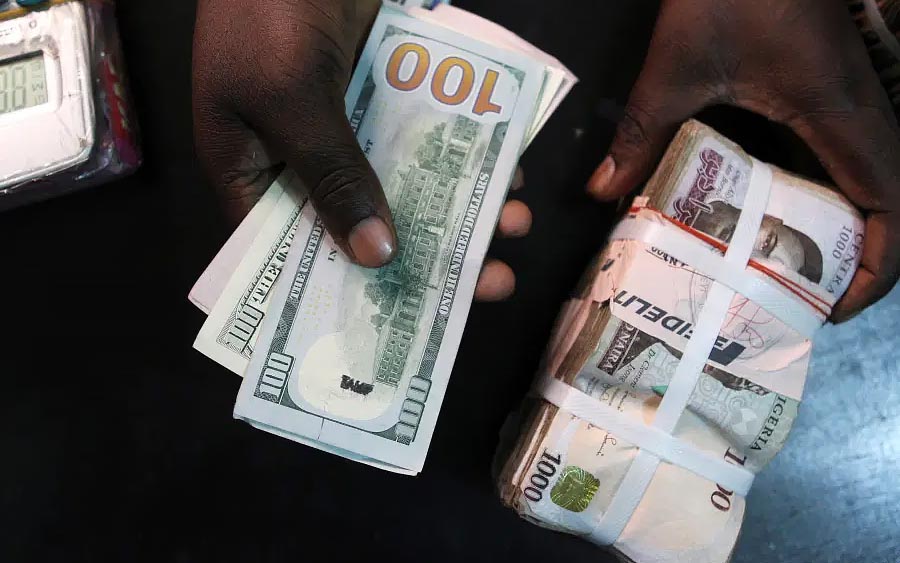Money and Fixed Income
Banks Ration Dollar as Foreign Reserves Fall to $38.57 Billion
Published
4 years agoon

The country’s external or foreign reserves hit a seven-month low after falling to $38.57bn as of May 25, 2022, figures obtained from the Central Bank of Nigeria (CBN) have revealed.
Findings have shown that the continuous decline in the country’s external reserves used to defend the naira value is making the banks tighten access to foreign exchange to travellers and other legitimate users as scarcity bites harder.
Read Also:
According to figures obtained from the CBN on movement in external reserves, the reserves which had been fluctuating for weeks now, experienced its lowest of $39.01bn and $38.39bn on October 10 and 8, 2021 respectively.
Due to scarcity, many banks are extending waiting period to access forex for foreign trips, thereby denying travellers with urgent trips access to apply for Personal Travel Allowance or the Business Travel Allowance requests.
The banks have also been reducing the amount a customer can spend on the cards in dollar terms as a response to the falling coiuntry’s foreign reserves.
Ecobank Nigeria on Sunday explained its current stand on retail foreign exchange transactions for international school fees, accommodation and upkeep payments as well as PTA/BTA requests.
The Head, Consumer Banking, Korede Demola-Adeniyi, Ecobank said, “Due to current market trends, we require a 30-day window to complete requests for school fees, accommodation, and upkeep.”
He said part of the process involved a review of all documents to ensure compliance with regulatory requirements.
The statement added that “In order to ensure smooth service and allow disbursement of PTA/BTA within the timeline, we request that applications are submitted with the required documentation.”
Access Bank also explained its stand in a mail to its customers on forex needs for international school fees, upkeep payments and PTA/BTA requests.
It stated that, “All requests are reviewed to ensure that they meet regulatory requirements. In addition, due to limited forex availability provided by the Central Bank of Nigeria, we require a 30-day period to fulfil requests for school fees, upkeep and rent payment.
“However, for PTA/BTA, we request that you submit your application 14 days before your proposed travel date to allow disbursement within the timeline.”
First Bank had earlier notified its customers of cut in dollar access in a mail titled, ‘Reduction of naira card cross border rate to $20’.
“Due to current market realities on foreign exchange, we’ve reviewed cross border transaction limits for the Naira Mastercard, Naira Credit Card, our Virtual card and Visa Prepaid Naira card further to $20 monthly. This will take effect on 1 April 2022. Also, International ATM withdrawals will not be allowed with our Naira cards at this time.”
The CBN Governor, Godwin Emefiele, while giving reasons on dwindling reserves at the last Monetary Policy Committee (MPC) meeting, noted that the gross external reserves declined moderately from $39.28bn at the end of March 2022.
“This was attributed to the weak accretion to the foreign reserves from exports and the high cost of importation of refined petroleum products,” he said.
A past President, Association of National Accountants of Nigeria, Dr Sam Nzekwe, said politicians were mopping up the forex for their campaign.
He said, “Part of the reasons why there is no forex is the activities of the politicians. They cannot carry huge sum of naira to spend for delegates so they have changed all the whole money into dollars.
“You will see that after all the primaries, the dollar will come down. The banks don’t have dollar to give to genuine importers. Also, the speculative activities on forex are not helpful. Nigeria needs to be productive to earn more forex.”
According to him, external and internal volatilities are having effects on the forex.
Business Metrics earlier reported serious pressure on the external reserves and the ripple effect on the naira which has continued to nosedived when placed against the dollar. READ MORE.
Share this:
- Click to share on X (Opens in new window) X
- Click to share on Facebook (Opens in new window) Facebook
- Click to share on WhatsApp (Opens in new window) WhatsApp
- Click to share on Pocket (Opens in new window) Pocket
- Click to share on Telegram (Opens in new window) Telegram
- Click to email a link to a friend (Opens in new window) Email
- Click to share on LinkedIn (Opens in new window) LinkedIn
You may like


Nigerian Banks Set New Target to Respond to Frauds


NCC, CBN Introduce 30-Second Refund Rule for Failed Airtime and Data Purchases


Banks’ N1.96Trn Black Hole: Who Took the Loans, Who Defaulted, and Why the Real Economy Suffers


How Policy Missteps Weigh Down Nigeria’s Fragile Banking Giants


Nigeria at 65: A Nation Still Waiting for a Banking Revolution


Nigeria’s Banking Woes: How One South African Bank Outvalues an Entire Industry












